基本句型练习(主谓宾)
- 格式:docx
- 大小:11.65 KB
- 文档页数:3
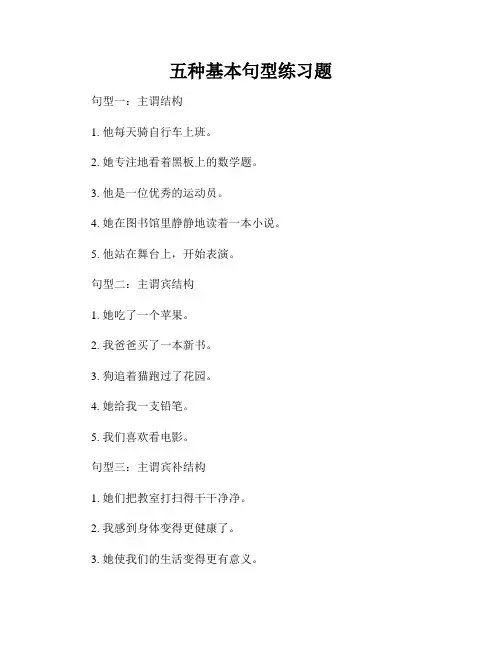
五种基本句型练习题句型一:主谓结构
1. 他每天骑自行车上班。
2. 她专注地看着黑板上的数学题。
3. 他是一位优秀的运动员。
4. 她在图书馆里静静地读着一本小说。
5. 他站在舞台上,开始表演。
句型二:主谓宾结构
1. 她吃了一个苹果。
2. 我爸爸买了一本新书。
3. 狗追着猫跑过了花园。
4. 她给我一支铅笔。
5. 我们喜欢看电影。
句型三:主谓宾补结构
1. 她们把教室打扫得干干净净。
2. 我感到身体变得更健康了。
3. 她使我们的生活变得更有意义。
4. 他被选为班长。
5. 这只小鸟使整个森林变得生机勃勃。
句型四:主系表结构
1. 她是一位聪明的学生。
2. 这个包包看起来很漂亮。
3. 她的笑容让人感到温暖。
4. 这部电影让我流下了眼泪。
5. 这首歌曲让我回忆起过去的时光。
句型五:主谓双宾结构
1. 妈妈给了我一个礼物。
2. 他送给我一束鲜花。
3. 我们给孩子们买了一些玩具。
4. 奶奶经常做好吃的给我们。
5. 爸爸买了一张机票给我。
通过以上的练习题,我们可以巩固五种基本句型的用法。
掌握这些句型的使用,可以帮助我们构建准确、通顺的句子,使我们的表达更加准确和流畅。
希望大家能够认真练习并灵活运用这些句型,提高自
己的写作和口语能力。
通过不断的练习和实践,我们一定能够取得进步!。

简单句的五种基本结构专练1.主谓结构:主语+谓语(不及物动词)(1)主谓结构中谓语常用来表示主语的动作或状态。
这种句型中的谓语动词为不及物动词,故不能接宾语,也没有被动语态。
常见的不及物动词或短语有:arrive, walk, fall, rise, happen, exist, ride, occur, agree, flow, take place, break out, come about等。
翻译:刘洋在天宫一号太空实验室里轻松地骑自行车。
________________________________________________________________________(2)不及物动词或短语后不能接宾语,要特别注意英汉表达的差异。
翻译:他家昨晚发生了一场火灾。
________________________________________________________________________[练一练]本周五晚自习之后我们将于8∶00在学生俱乐部集合。
________________________________________________________________________2.主谓宾结构:主语+谓语(及物动词)+宾语(1)这种句型中的谓语动词必须是及物动词或动词短语,可有被动语态。
翻译:我们都拥有相同的机会。
________________________________________________________________________(2)在“动词+介词”的动词短语中,宾语只能接在介词之后;在“动词+副词”的动词短语中,作宾语的名词放于副词前后皆可;作宾语的代词只能放在副词之前。
①Please wake Li Ling up (=wake up Li Ling) at six thirty in the morning. ( )②Please wake her up at six thirty in the morning. ( )③Please wake up her at six thirty in the morning. ( )[练一练]我们每个人都将准备一个小礼物。
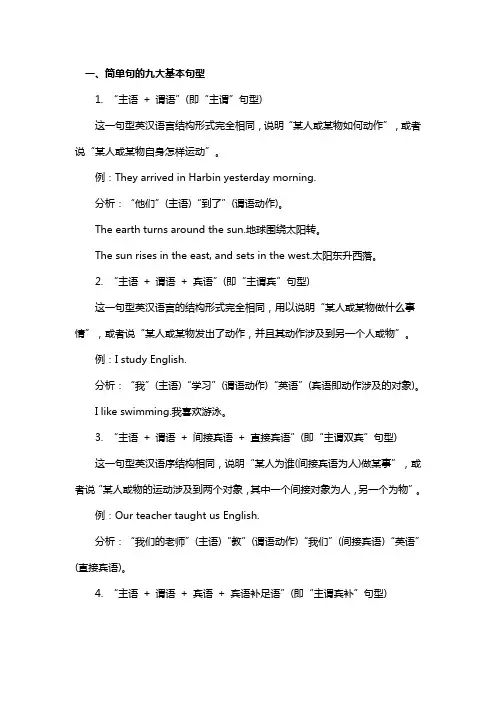
一、简单句的九大基本句型1. “主语+ 谓语”(即“主谓”句型)这一句型英汉语言结构形式完全相同,说明“某人或某物如何动作”,或者说“某人或某物自身怎样运动”。
例:They arrived in Harbin yesterday morning.分析:“他们”(主语)“到了”(谓语动作)。
The earth turns around the sun.地球围绕太阳转。
The sun rises in the east, and sets in the west.太阳东升西落。
2. “主语+ 谓语+ 宾语”(即“主谓宾”句型)这一句型英汉语言的结构形式完全相同,用以说明“某人或某物做什么事情”,或者说“某人或某物发出了动作,并且其动作涉及到另一个人或物”。
例:I study English.分析:“我”(主语)“学习”(谓语动作)“英语”(宾语即动作涉及的对象)。
I like swimming.我喜欢游泳。
3. “主语+ 谓语+ 间接宾语+ 直接宾语”(即“主谓双宾”句型)这一句型英汉语序结构相同,说明“某人为谁(间接宾语为人)做某事”,或者说“某人或物的运动涉及到两个对象,其中一个间接对象为人,另一个为物”。
例:Our teacher taught us English.分析:“我们的老师”(主语)“教”(谓语动作)“我们”(间接宾语)“英语”(直接宾语)。
4. “主语+ 谓语+ 宾语+ 宾语补足语”(即“主谓宾补”句型)这一句型说明“某人或某物要求(使、让)某人做什么”或“某人感觉某人或物怎么样”。
例:He asked her to go there.分析:“他”(主语)“要求”(谓语动作)“她”(宾语即动作涉及的对象)“去那里”(补语—补充说明宾语应做什么)。
5. “主语+ have + 宾语”(即“拥有”句型)这一句型主要用于说明“某人或某物拥有什么(宾语,即有形或无形的资源)”。
例:You have a nice watch. 你有一块漂亮的手表分析:“你”拥有一块漂亮的手表,即你拥有一个可以及时且漂亮的器具。
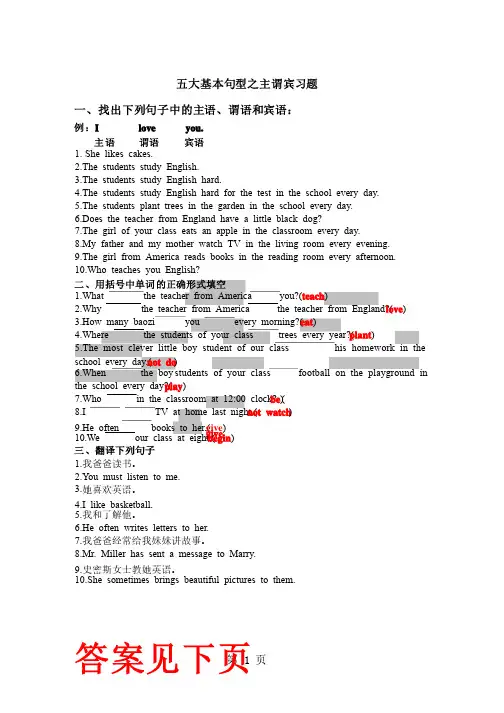
五大基本句型之主谓宾习题一、找出下列句子中的主语、谓语和宾语:例:I love you.主语谓语宾语1.She likes cakes. 2.The students study English. 3.The students study English hard. 4.The students study English hard for the test in the school every day. 5.The students plant trees in the garden in the school every day. 6.Does the teacher from England have a little black dog? 7.The girl of your class eats an apple in the classroom every day. 8.My father and my mother watch TV in the living room every evening. 9.The girl from America reads books in the reading room every afternoon. 10.Who teaches you English? 二、用括号中单词的正确形式填空1.What the teacher from America you?(teach) 2.Why the teacher from America the teacher from England?(love) 3.How many baozi you every morning?(eat) 4.Where the students of your class trees every year?(plant) 5.The most clever little boy student of our class his homework in the school every day.(n otnot do) 6.When the boy students of your class football on the playground in the school every day?(play) 7.Who in the classroom at 12:00 clock? (be) 8.I TV at home last night.(not watch) 9.He often books to her.(g ivegive) 10.We our class at eight.(begin) 三、翻译下列句子1.我爸爸读书。
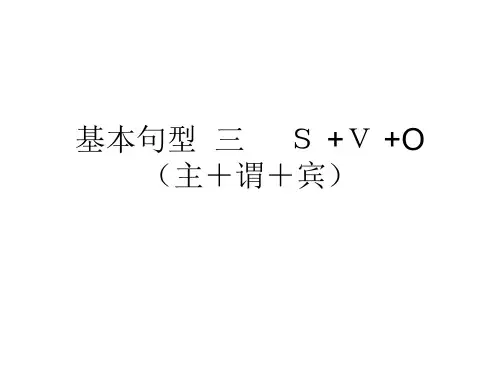
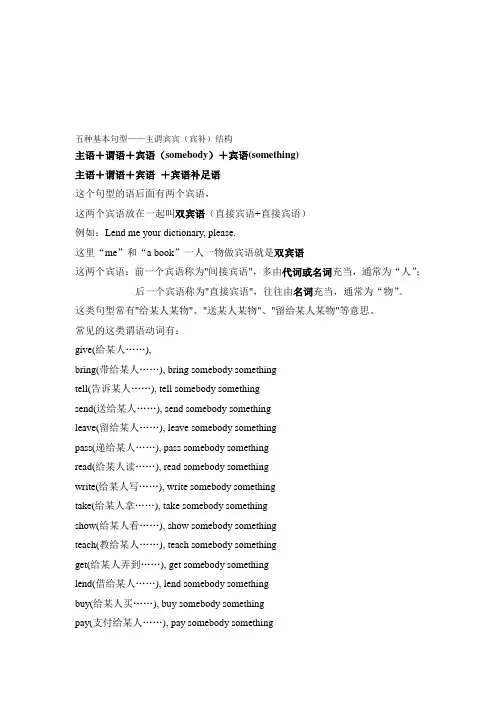
五种基本句型——主谓宾宾(宾补)结构主语+谓语+宾语(somebody)+宾语(something)主语+谓语+宾语+宾语补足语这个句型的语后面有两个宾语,这两个宾语放在一起叫双宾语(直接宾语+直接宾语)例如:Lend me your dictionary, please.这里“me”和“a book”一人一物做宾语就是双宾语这两个宾语:前一个宾语称为"间接宾语",多由代词或名词充当,通常为“人”;后一个宾语称为"直接宾语",往往由名词充当,通常为“物”。
这类句型常有"给某人某物"、"送某人某物"、"留给某人某物"等意思。
常见的这类谓语动词有:give(给某人……),bring(带给某人……), bring somebody somethingtell(告诉某人……), tell somebody somethingsend(送给某人……), send somebody somethingleave(留给某人……), leave somebody somethingpass(递给某人……), pass somebody somethingread(给某人读……), read somebody somethingwrite(给某人写……), write somebody somethingtake(给某人拿……), take somebody somethingshow(给某人看……), show somebody somethingteach(教给某人……), teach somebody somethingget(给某人弄到……), get somebody somethinglend(借给某人……), lend somebody somethingbuy(给某人买……), buy somebody somethingpay(支付给某人……), pay somebody somethinghand(递给某人……) 。
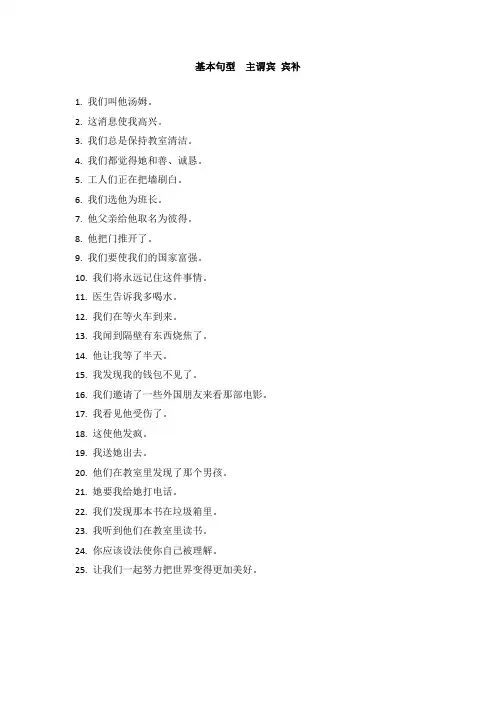
1. 我们叫他汤姆。
2. 这消息使我高兴。
3. 我们总是保持教室清洁。
4. 我们都觉得她和善、诚恳。
5. 工人们正在把墙刷白。
6. 我们选他为班长。
7. 他父亲给他取名为彼得。
8. 他把门推开了。
9. 我们要使我们的国家富强。
10. 我们将永远记住这件事情。
11. 医生告诉我多喝水。
12. 我们在等火车到来。
13. 我闻到隔壁有东西烧焦了。
14. 他让我等了半天。
15. 我发现我的钱包不见了。
16. 我们邀请了一些外国朋友来看那部电影。
17. 我看见他受伤了。
18. 这使他发疯。
19. 我送她出去。
20. 他们在教室里发现了那个男孩。
21. 她要我给她打电话。
22. 我们发现那本书在垃圾箱里。
23. 我听到他们在教室里读书。
24. 你应该设法使你自己被理解。
25. 让我们一起努力把世界变得更加美好。
1.We call him Tom.2.The news made me happy.3.We always keep our classroom clean.4.We all thought her nice and sincere.5.Workers are painting the wall white.6.We elected him monitor.7.His father named him Peter.8.He pushed the door open.9.We should make our country wealthy and powerful.10.We will always keep it in mind.11.The doctor told me to drink plenty of water.12.We are waiting for the train to arrive.13.I smelt something burning in the next room.14.He kept me waiting half a day.15.I found my wallet missing.16.We invited some foreign friends to see the film.17.I saw him wounded.18.It drove him mad.19.I showed her out.20.They found the boy in the classroom.21.She asked me to call her.22.We found the book in the dustbin.23.I heard them reading in the classroom.24.You should try to make yourself understood.25.Let’s work together to make our world a better place.。
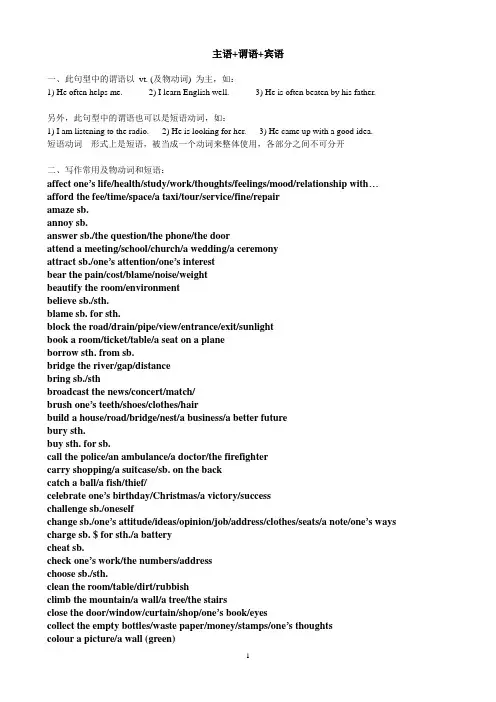
主语+谓语+宾语一、此句型中的谓语以vt. (及物动词) 为主,如:1) He often helps me. 2) I learn English well. 3) He is often beaten by his father.另外,此句型中的谓语也可以是短语动词,如:1) I am listening to the radio. 2) He is looking for her. 3) He came up with a good idea.短语动词---形式上是短语,被当成一个动词来整体使用,各部分之间不可分开二、写作常用及物动词和短语:affect one’s life/health/study/work/thoughts/feelings/mood/relationship with…afford the fee/time/space/a taxi/tour/service/fine/repairamaze sb.annoy sb.answer sb./the question/the phone/the doorattend a meeting/school/church/a wedding/a ceremonyattract sb./one’s attention/one’s interestbear the pain/cost/blame/noise/weightbeautify the room/environmentbelieve sb./sth.blame sb. for sth.block the road/drain/pipe/view/entrance/exit/sunlightbook a room/ticket/table/a seat on a planeborrow sth. from sb.bridge the river/gap/distancebring sb./sthbroadcast the news/concert/match/brush one’s teeth/shoes/clothes/hairbuild a house/road/bridge/nest/a business/a better futurebury sth.buy sth. for sb.call the police/an ambulance/a doctor/the firefightercarry shopping/a suitcase/sb. on the backcatch a ball/a fish/thief/celebrate one’s birthday/Christmas/a victory/successchallenge sb./oneselfchange sb./one’s attitude/ideas/opinion/job/address/clothes/seats/a note/one’s ways charge sb. $ for sth./a batterycheat sb.check one’s work/the numbers/addresschoose sb./sth.clean the room/table/dirt/rubbishclimb the mountain/a wall/a tree/the stairsclose the door/window/curtain/shop/one’s book/eyescollect the empty bottles/waste paper/money/stamps/one’s thoughtscomfort sb.complete the work/task/formconfuse sb./A with Bcontain water/50 litres/13% alcoholcontribute money/what one can afford/poems to…control sb./oneself/a car/a plane/traffic/pricesconvey feelings/message/good wishes to sb.cook breakfast/dinnercopy notes/ one’s style /sb.correct sb./one’s mistake/the watch/an essay/a testcost $/one’s life/time/patiencecountcover A with B/ one’s nervousnesscross a road/a river/ the sea/ mountain/one’s legs/armscut one’s fingers/hair/nails/the cake/ the apple/ a rope/decorate the room/ street/Christmas tree/carddefeat sb./one’s teamdeliver the goods/parcel/message/a speechdescribe sb./sth.design a timetable/a route/posterdestroy the road/bridge/house/one’s hope/career/reputation/imagedial 110 /119 / 999 / the number on the receiptdig the ground/a hole/a tunneldiscuss the problems/plandisturb sb./the papers on the table/the silencedonate money/goodsdoubt my word/从句draw a picture/sb. aside/sth. out of…/a conclusion/ some money from the bank(my account) drink water/milkdrive a car/taxieat dinner/one’s words承认说错话educate sb.(children/the public)enter the room/a school/university/a race/examexamine sb./sth.exchange sth. with sb./A for Bexpect an answer/reply/letter/present from sb.experience pleasure/pain/difficulty/hardshipexplain one’s idea/plan/the problem/case to sb.express one’s thanks/feels to sb.face sb./south/the street/dangers/difficultiesfail a test/an examfetch a doctor/sth.findfinish one’s work/a book/the foodfix a shelf to the wall/a post in the ground/a watch/one’s eyes on…forget one’s name/birthday/the addressforgive sb./oneself for sth/doing sth.gain one’s affections/trust/experience/strengthgrasp the rope/one’s hand/an opportunityhang sth. on the hook/line/wallharm sb./the relationshelp sb./each other/othershit a tree/ the wall/ a ball/ the nail with a hammer/ sb. on the head hit the road上路、出发hold one’s hand/ an umbrella/a baby in one’s arms/one’s attention/a meeting/ the view/ 200 people/5 litres waterhug sb./each otherhurt sb/ oneself/one’s pride/confidenceignore sb./one’s rudenessimprove one’s work/health/study/English/math/the quality of service/injure sb. /oneself/one’s health/reputationinsert a key/card into…inspire sb./confidence/hope/enthusiasm in sb.interrupt the meeting/discussion/one’s speech/sb.introduce sb. to sb. /sth. to sb. / sb. to sth. (introduce us to the ocean of knowledge)invite to dinner/ to a party/to have dinner/to give a talkjudgelacklearnlightlimitlosemarkmeasuremeetmendmissmixmopmoveneednoticeobeyobserveopposeorderorganizepackpaintparkpasspersuade plant play please pollute post praise press promote pull punish push puzzle reach read realise receive recognize record recycle reject remove rent repair repeat represent rescue respect return review rideringrollrowruin save scold search seize select sell send separate serve shakeshowsingspellstealstickstop strengthen studysuit support surprise surround survive teartellthank throwtietime translate treat trouble trust understand usevalue voicewarn wash waste watch water wavewear welcome witness wonderadapt (oneself) to…adjust (oneself)to…admire sb. fordialcheer sb. up devote…to…divide…into…feed sth. to sb.=feed sb. on / with sth. fill sth. with sth.focus sth. on…gather / collect information / materials greet sb. with a sweet smilefollow the example offly the kiteprotect …from provide sb. with sth. supply sb. with sth. raise money / a pet dog remind sb. of sth.注意1:下列短语动词之后用ing作宾语1) Paula has given up smoking.2) We can’t go on living like this!3) I feel like having a cup of tea.4) I can’t help crying.5) It kept on raining for three days.6) I’m looking forward to hearing from you.7) He set about doing his homework.8) I dream of becoming an excellent doctor.9) We put off going camping due to the bad weather.10) All of us have succeeded in passing the exam.11) They are thinking of going abroad for further study.12) The woman scientist insisted on going there in winter.注意2:下列动词后既可以跟不定式又可以跟动词-ing形式作宾语, 意义基本无差别。
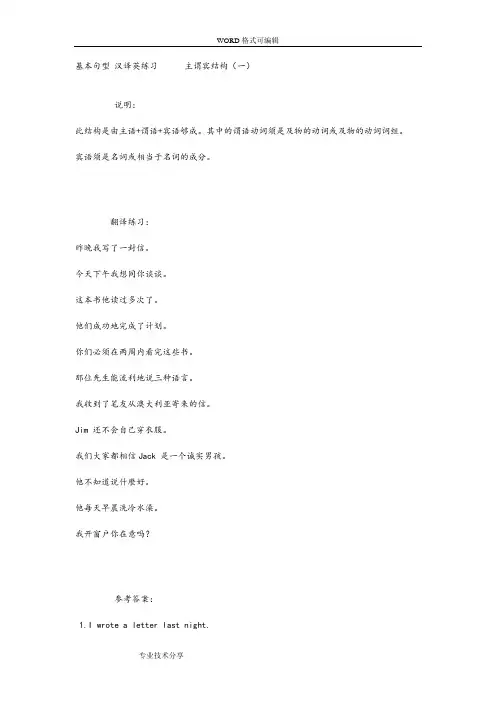
基本句型汉译英练习主谓宾结构(一)说明:此结构是由主语+谓语+宾语够成。
其中的谓语动词须是及物的动词或及物的动词词组。
宾语须是名词或相当于名词的成分。
翻译练习:昨晚我写了一封信。
今天下午我想同你谈谈。
这本书他读过多次了。
他们成功地完成了计划。
你们必须在两周内看完这些书。
那位先生能流利地说三种语言。
我收到了笔友从澳大利亚寄来的信。
Jim 还不会自己穿衣服。
我们大家都相信Jack 是一个诚实男孩。
他不知道说什麽好。
他每天早晨洗冷水澡。
我开窗户你在意吗?参考答案:1.I wrote a letter last night.2.I want to talk with you this afternoon.3.He has read this book many times.4.They have carried out the plan successfully.5.You must finish reading these books in two weeks.6.That gentlemen can speak three languages fluently.7.I received a letter from my pen friend in Australia.8.Jim cannot dress himself.9.All of us believe that Jack is an honest boy.10.He did not know what to say.11.He takes a cold bath every morning.12.Do you mind my opening the window?主谓宾结构(二)说明:此结构中的谓语动词常常是动词词组,分两种情况:1.及物动词+副词,2.不及物动词+介词。
1.含有away, out, forward, up 等副词的动词词组是可拆分的。
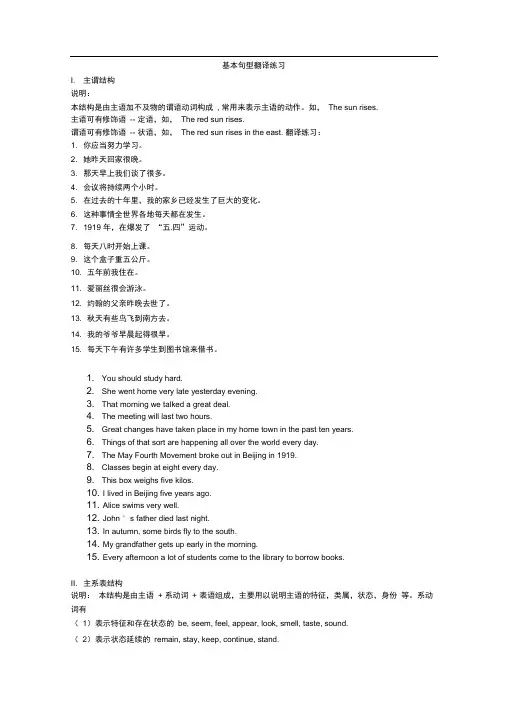
基本句型翻译练习I. 主谓结构说明:本结构是由主语加不及物的谓语动词构成, 常用来表示主语的动作。
如,The sun rises.主语可有修饰语-- 定语,如,The red sun rises.谓语可有修饰语-- 状语,如,The red sun rises in the east. 翻译练习:1. 你应当努力学习。
2. 她昨天回家很晚。
3. 那天早上我们谈了很多。
4. 会议将持续两个小时。
5. 在过去的十年里,我的家乡已经发生了巨大的变化。
6. 这种事情全世界各地每天都在发生。
7. 1919 年,在爆发了“五.四”运动。
8. 每天八时开始上课。
9. 这个盒子重五公斤。
10. 五年前我住在。
11. 爱丽丝很会游泳。
12. 约翰的父亲昨晚去世了。
13. 秋天有些鸟飞到南方去。
14. 我的爷爷早晨起得很早。
15. 每天下午有许多学生到图书馆来借书。
1. You should study hard.2. She went home very late yesterday evening.3. That morning we talked a great deal.4. The meeting will last two hours.5. Great changes have taken place in my home town in the past ten years.6. Things of that sort are happening all over the world every day.7. The May Fourth Movement broke out in Beijing in 1919.8. Classes begin at eight every day.9. This box weighs five kilos.10. I lived in Beijing five years ago.11. Alice swims very well.12. John ' s father died last night.13. In autumn, some birds fly to the south.14. My grandfather gets up early in the morning.15. Every afternoon a lot of students come to the library to borrow books.II. 主系表结构说明:本结构是由主语+ 系动词+ 表语组成,主要用以说明主语的特征,类属,状态,身份等。
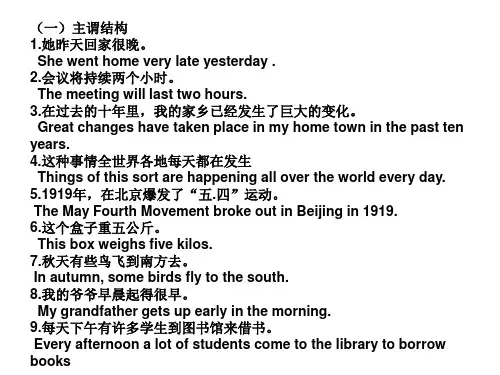
主谓宾的句子语文
主谓宾句是语文中最基本的句型,由主语、谓语和宾语三个成分组成。
主语是句子的主要话题,通常是名词或代词,表达谓语所说的动作或状态。
谓语是句子的核心,表达主语所做的动作或所处的状态。
宾语是谓语的补充,表示行为的承受者或受益者,通常是名词或代词。
例如:
-我们看电影。
(主语:我们;谓语:看;宾语:电影)。
-她吃水果。
(主语:她;谓语:吃;宾语:水果)。
-他们听老师讲课。
(主语:他们;谓语:听;宾语:老师讲课)。
在主谓宾句中,主语和宾语可通过动词互换位置,但谓语的意义不能
改变。
例如:
-电影我们看。
(主语:电影;谓语:看;宾语:我们)。
-水果她吃。
(主语:水果;谓语:吃;宾语:她)。
-老师讲课他们听。
(主语:老师讲课;谓语:听;宾语:他们)。
除了名词和代词,宾语还可是其他种类的词类,如动词不定式、形容词、副词等。
例如:
-我们喜欢唱歌。
(宾语是动词不定式“唱歌”)。
-天气炎热,我感到很难受。
(宾语是形容词“很难受”)。
五种基本句型——主谓(宾)结构主(语)+谓(语)主(语)+谓(语)+宾(语)主语(略)谓语:从意义上说,有表示动作和状态两种情况;表示状态的就用“主语+连系动词+表语”句型来表示。
表示动作的就用“主语+谓语(+宾语)”句型来表示谓语后面加不加宾语,要看表动作的谓语及不及物。
在了解及物和不及物动词之前,先讲讲宾语。
宾语,是动词作用的对象,通常是由名词或代词来充当。
从位置上来看,位于谓语动词之后,例如:He reads English .在这里English 就是作reads 的宾语。
及物动词和不及物动词:不讲语法上的概念了,直接看例子。
例如:1. I like English. 这里的like 是及物动词。
因为它后面直接跟了个宾语English, 如果它后面不跟English的话,句子含义就不完整,你到底喜欢什么呢,好像话没说完似的,所以说及物动词后面必须带宾语。
2. He often swims in the river(他经常在河里游泳),这里的swims 是不及物动词。
因为它后面没带宾语,说他游泳句子意思已经表达很清楚完整了,没必要再加宾语了。
注意:in the river不是宾语!因为它不可能作为“游泳”的对象(但“英语”可以做为“喜欢”的对象)。
实际上,in the river 在这里是状语的,而且是表示地点的状语。
及物动词和不及物动词之秘诀一、及物动词后面直接加宾语,不及物动词后是不能直接加宾语,但有些不及物动词后面加介词或副词之后就可以加宾语了(例如:look 是典型的不及物动词,后面是不能接宾语的,但是如果加上适当的介词就可以跟宾语如look at the blackboard 、look for the child 、lokk after his mother等等)。
秘诀二、及物动词后面必须加宾语,因为不加宾语,句意就不完整了。
秘诀三、绝大多数动词既可以作及物动词也可以作不及物动词,只作及物动词或不及物动词的动词是很少一部分。
基本句型(二)主语+及物动词+宾语(?S?+?V?+O?)?1.?昨晚我写了一封信。
?__________________________________________________________?2.?我父亲能流利地说英语。
fluently?__________________________________________________________?3.?你介意我开窗户吗??__________________________________________________________?4.?你们必须在两周之内看完那些书。
?__________________________________________________________?5.?他指出我的作文中的错误。
point?out,??composition?__________________________________________________________?6.?我们必须派人去请医生。
?_________________________________________________________?7.?你在工作中可以依靠他。
?__________________________________________________________?8.?写完作文后,我们必须检查一遍。
go?over?基本句型(二)主语+及物动词+宾语(?S?+?V?+O?)?1.?昨晚我写了一封信。
?__________________________________________________________?2.?我父亲能流利地说英语。
fluently?__________________________________________________________?3.?你介意我开窗户吗??__________________________________________________________?4.?你们必须在两周之内看完那些书。
五种基本句型__主谓宾宾(宾补)结构_实⽤练习加详细解析五种基本句型——主谓宾宾(宾补)结构主语+谓语+宾语(somebody)+宾语(something)主语+谓语+宾语+宾语补⾜语这个句型的语后⾯有两个宾语,这两个宾语放在⼀起叫双宾语(直接宾语+直接宾语)例如:Lend me your dictionary, please.这⾥“me”和“a book”⼀⼈⼀物做宾语就是双宾语这两个宾语:前⼀个宾语称为"间接宾语",多由代词或名词充当,通常为“⼈”;后⼀个宾语称为"直接宾语",往往由名词充当,通常为“物”。
这类句型常有"给某⼈某物"、"送某⼈某物"、"留给某⼈某物"等意思。
常见的这类谓语动词有:give(给某⼈……),bring(带给某⼈……), bring somebody somethingtell(告诉某⼈……), tell somebody somethingsend(送给某⼈……), send somebody somethingleave(留给某⼈……), leave somebody somethingpass(递给某⼈……), pass somebody somethingread(给某⼈读……), read somebody somethingwrite(给某⼈写……), write somebody somethingtake(给某⼈拿……), take somebody somethingshow(给某⼈看……), show somebody somethingteach(教给某⼈……), teach somebody somethingget(给某⼈弄到……), get somebody somethinglend(借给某⼈……), lend somebody somethingbuy(给某⼈买……), buy somebody somethingpay(⽀付给某⼈……), pay somebody somethinghand(递给某⼈……) 。
五种基本句型——主谓(宾)结构主(语)+谓(语)练习一判断下列句子是主谓结构还是主谓宾结构,如果是主谓宾结构请指出是由什么充当的宾语(名词、代词、动词不定式、doing 等等)1 He arrived yesterday.2 The boy is crying loudly.3 She died in 2000.4 The man disappeared in the street.5 I like music.6 She wanted some help7 I slept well last night. 8 Iom built a house last year.9 I bought a computer in the street yesterday10 .Tom often swims in the river11 .My sister works in that factory.12 .The sun is rising. 13 .They know him.14 .He enjoys listening to music. 15 .My watch has stopped.16 .It is snowing hard. 17 .My grandma coughed all night.18 .She was cooking. 19 .I found a box under the bed.20 .Kate described the picture. 21 .I hate to go there.22 .He remembered telling you. 23 .His aunt will come.24 .The farmer works very hard. 25 .The flowers need watering.26 .We usually watch TV on Saturday evening.27 .She has cleaned the room. 28 .He liked collecting stamps.29 .Both of them work in the school library.30 .Kate is running fast. 31 .The ship moves slowly32 .He wanted two boxes watches. 33 .I read every book in the school library.34 .You can understand me. 35 .We can watch TV.36 .The children are reading carefully. 37 .Mr. Smith speaks very fast.38 .The train has arrived. 39 .They won’t come today.40 .You mustn’t talk loud 41 .You will close the door.42 .She decided to wait. 43 .I met one of my friends in Beijing.44 .He passed the exam last year. 45 .China has a large population.46 .He knows a little English. 47 .I have received your letter.48 .The students answered the questions.49 .He is beginning a new life. 50 .He learned to ride a bike yesterday.51 .Have you finished writing? 52 .I suggest trying it once more.53 .I want to go to college. 54 .She often dances in the park.55 .Kate often studies at school at night.练习三答案1 He arrived yesterday.他昨天到达。
五种基本句型——主()构主++(somebody)+ (something)主+++足个句型的后边有两个,两个放在一起叫双(直接+直接)比方: Lend me your dictionary, please.里“ me”和“ a book ”一人一物做就是双两个:前一个称"接 ",多由代或名充当,平时“人” ;后一个称 "直接 ",经常由名充当,平时“物”。
句型常有 " 某人某物 " 、"送某人某物 " 、 "留某人某物 "等意思。
常的有:give( 某人⋯⋯ ),bring( 某人⋯⋯ ), bring somebody somethingtell( 告某人⋯⋯ ), tell somebody somethingsend( 送某人⋯⋯ ), send somebody somethingleave( 留某人⋯⋯ ), leave somebody somethingpass( 某人⋯⋯ ), pass somebody somethingread( 某人⋯⋯ ), read somebody somethingwrite(某人写⋯⋯), write somebody somethingtake( 某人拿⋯⋯ ), take somebody somethingshow(某人看⋯⋯ ), show somebody somethingteach( 教某人⋯⋯ ), teach somebody somethingget( 某人弄到⋯⋯ ), get somebody somethinglend( 借某人⋯⋯ ), lend somebody somethingbuy( 某人⋯⋯ ), buy somebody somethingpay( 支付某人⋯⋯ ), pay somebody somethinghand( 某人⋯⋯ ) 。
基本句型(二)主语+及物动词+宾语( S + V +O )
1. 昨晚我写了一封信。
__________________________________________________________ 2. 我父亲能流利地说英语。
fluently
__________________________________________________________ 3. 你介意我开窗户吗?
__________________________________________________________ 4. 你们必须在两周之内看完那些书。
__________________________________________________________ 5. 他指出我的作文中的错误。
point out, composition
__________________________________________________________ 6. 我们必须派人去请医生。
_________________________________________________________ 7. 你在工作中可以依靠他。
__________________________________________________________ 8. 写完作文后,我们必须检查一遍。
go over
基本句型(二)主语+及物动词+宾语( S + V +O )
1. 昨晚我写了一封信。
__________________________________________________________ 2. 我父亲能流利地说英语。
fluently
__________________________________________________________ 3. 你介意我开窗户吗?
__________________________________________________________ 4. 你们必须在两周之内看完那些书。
__________________________________________________________ 5. 他指出我的作文中的错误。
point out, composition
__________________________________________________________ 6. 我们必须派人去请医生。
_________________________________________________________ 7. 你在工作中可以依靠他。
__________________________________________________________ 8. 写完作文后,我们必须检查一遍。
go over
__________________________________________________________
基本句型(二)主语+及物动词+宾语( S + V +O )
1. 昨晚我写了一封信。
__________________________________________________________ 2. 我父亲能流利地说英语。
fluently
__________________________________________________________ 3. 你介意我开窗户吗?
__________________________________________________________ 4. 你们必须在两周之内看完那些书。
__________________________________________________________ 5. 他指出我的作文中的错误。
point out, composition
__________________________________________________________ 6. 我们必须派人去请医生。
_________________________________________________________ 7. 你在工作中可以依靠他。
__________________________________________________________ 8. 写完作文后,我们必须检查一遍。
go over
__________________________________________________________ 基本句型(二)主语+及物动词+宾语( S + V +O )
1. 昨晚我写了一封信。
__________________________________________________________ 2. 我父亲能流利地说英语。
fluently
__________________________________________________________ 3. 你介意我开窗户吗?
__________________________________________________________ 4. 你们必须在两周之内看完那些书。
__________________________________________________________ 5. 他指出我的作文中的错误。
point out, composition
__________________________________________________________ 6. 我们必须派人去请医生。
_________________________________________________________ 7. 你在工作中可以依靠他。
__________________________________________________________ 8. 写完作文后,我们必须检查一遍。
go over
__________________________________________________________
基本句型(二)主语+及物动词+宾语( S + V +O )
1. 昨晚我写了一封信。
__________________________________________________________ 2. 我父亲能流利地说英语。
fluently
__________________________________________________________ 3. 你介意我开窗户吗?
__________________________________________________________ 4. 你们必须在两周之内看完那些书。
__________________________________________________________ 5. 他指出我的作文中的错误。
point out, composition
__________________________________________________________ 6. 我们必须派人去请医生。
_________________________________________________________ 7. 你在工作中可以依靠他。
__________________________________________________________ 8. 写完作文后,我们必须检查一遍。
go over
__________________________________________________________ 基本句型(二)主语+及物动词+宾语( S + V +O )
1. 昨晚我写了一封信。
__________________________________________________________ 2. 我父亲能流利地说英语。
fluently
__________________________________________________________ 3. 你介意我开窗户吗?
__________________________________________________________ 4. 你们必须在两周之内看完那些书。
__________________________________________________________ 5. 他指出我的作文中的错误。
point out, composition
__________________________________________________________ 6. 我们必须派人去请医生。
_________________________________________________________ 7. 你在工作中可以依靠他。
__________________________________________________________ 8. 写完作文后,我们必须检查一遍。
go over
__________________________________________________________。